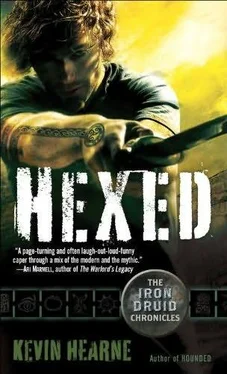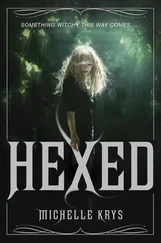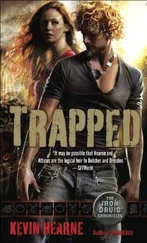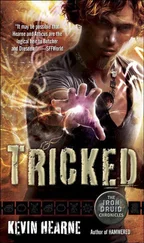“You may call me Mila in public,” Bogumila said. “The Americans stare if your name is too ethnic.”
I nodded with a half grin, and Hal—whose full name was Hallbjörn—said, “I know exactly what you mean.”
“Berta is over there in the kitchen.” Malina pointed to another dark-haired woman. Berta, who might be described as “festively plump,” was snacking on some kind of hors d’oeuvre, and she waved casually at the mention of her name. Malina proceeded to introduce the other three members of her coven, all of them blondes. Kazimiera was very tall and leggy, her tan skin and bright white teeth suggesting that she’d grown up on the beaches of California rather than under the cloudy skies of eastern Europe. Klaudia was the petite, waifish sort, with a pair of sleepy eyes and a set of pouty lips, her hair cut short and layered at the neck and her bangs teased around her face in a wet, languorous fashion, giving the impression that whenever you saw her, she had just finished having sex before you walked into the room and would now like nothing more than a French cigarette. I used to carry around a cigarette case expressly for the purpose of offering them to women like her, but that social custom lost its luster when people finally realized that offering someone a cigarette was the same thing as offering them lung cancer. Still, I patted absently where my vest pocket would be if I’d been wearing a vest, as in the late Victorian era.
The last of the Polish witches, Roksana, had her thick hair pulled back so tightly from her face that it appeared to be a crash helmet, but after routing itself severely through a silver loop at the base of her skull, it exploded into an untamed curly mane. Her owlish blue eyes regarded me steadily through a pair of round spectacles. She wore a power suit with a white blouse, shoulder-padded purple coat and black pants, and the pointy-toed black boots I’d come to associate with Malina. After a quick survey, I realized they all wore the same boots—and all of them wore something purple, though in Kazimiera’s case it was present only on a brooch she had fastened to her coat above her left breast.
I introduced Hal, because some of the witches had not met him yet. He produced two copies of the nonaggression treaty from his briefcase, all business, and likewise seven extremely sharp quills that we would use to sign it. The witches and I were each given a quill, and the signature pages of the treaties were settled on the black coffee table in front of Malina’s couch. One by one, the witches stabbed their palms with the quill and signed each copy of the treaty in blood. Then it was my turn.
I had argued for some time against signing in blood, when a fountain pen would have done just as well in legal terms; I did not want the coven to have any of my blood, period. The coven had argued vociferously for it, and eventually I gave way. In magical terms, it was much more binding, and those terms were far more strict than the legal ones. “People break the law all the time, Mr. O’Sullivan,” Malina pointed out. “People rarely break magical contracts, and those who do fail to live long afterward. Signing in blood is therefore not only for our protection, it is also for yours.”
Still, now that the moment had arrived, and six bloody signatures darkened as they dried in front of me, I hesitated. Signing it would contradict centuries of what I considered “best practice” in denying witches the opportunity to snuff me. But, truly, I saw no way forward without their help, and I needed it if I ever wished to have peace enough to restore the land around Tony Cabin. The sharp sting of the quill lingered as the blood welled out of my palm, and I did nothing to dampen the pain as I signed the treaties; it was right that I should feel it.
A general sigh of relief traveled around the room as I finished, tension releasing and tightly closeted smiles bursting free.
Berta clapped and said with a grin, “We should celebrate. Who wants chocolate and schnapps?” The suggestion was generally regarded as a fantastic one, and she bustled happily into the kitchen. The other witches came forward and shook Hal’s hand and mine, thanking us for our vision and willingness to cooperate; never had they felt so valued and respected; et cetera.
The hot chocolate and schnapps was served up with a plate of fresh-baked cookies that Berta had somehow produced. Malina rolled up the coven’s copy of the treaty, and Hal took mine and put it back in his briefcase so that the cookies could rest on the coffee table. Half of the coven sat themselves on the couch, and the rest of us pulled up assorted chairs so that we all sat in a sort of rough ellipse, with our chocolate and cookies in front of us and the orange and cardamom candles glowing merrily behind us around the room. It felt like one of the old European coffeehouses, except with far more purple than was advisable or permissible in Amsterdam or Paris.
I complimented Berta on the chocolate, then I said, “Tell me about die Töchter des dritten Hauses. ”
The witches all cleared their expressions. “What would you like to know?” Malina said in neutral tones, but only with some effort. She seemed to be controlling her anger against them rather than concealing anything from me.
“Could you perhaps fill me in on the nature of their grudge against you?” I asked. “You said it began during World War Two, but I’m a little sketchy on what you were doing then. I only heard a little bit of the story when we first met.”
“What did I tell you then?”
“You told me that you all met somehow in Poland during the Blitzkrieg,” I replied, “and an indeterminate time after that, you wound up in America.”
“That was all? Okay, we found each other in Warsaw,” Malina said. “Or, rather, Radomila found us and brought us together. And once we’d formed a coven, there was much discussion of what to do. We were divining almost constantly, trying to see what would happen, what we could do, where we could go. We saw the horror that was coming and knew there was nothing we could do about it in Poland—things had progressed so far, so quickly, that our protections would be useless, and the people we needed to reach in Germany were unreachable. We may have been powerful as witches go, but even we could not turn back the Panzer divisions or stop the SS from doing whatever they pleased. We did see where we could do some good, though, so we left Warsaw a week before it fell and made our way into Bulgaria.”
“Bulgaria?” I frowned. “But that was an Axis power as well.”
“Yes, but on what terms? Czar Boris the Third joined the Axis to prevent German invasion of his country, but he committed no Bulgarian troops to the fighting. Hitler wanted him to invade Russia and ease some of the pressure on his eastern front, but Boris refused. He also flatly refused to send fifty thousand Bulgarian Jews to the death camps in Poland. I think we did well there for a while.”
My jaw dropped as the import of her words hit home. “You’re seriously taking credit for that?”
“We settled in Sofia and stayed until the assassination. We saved many lives.”
I ignored her self-congratulation and asked, “Whose assassination?”
“We’re still talking about Boris the Third.”
“Ah, yes. Who do you think killed him? There wasn’t a grassy knoll in the palace of Sofia.”
“Die Töchter des dritten Hauses.”
I shook my head. “No, I’m sorry, I do know a little bit about his death. They exhumed the body and performed an autopsy and confirmed he died of heart failure, nothing more.”
Читать дальше











